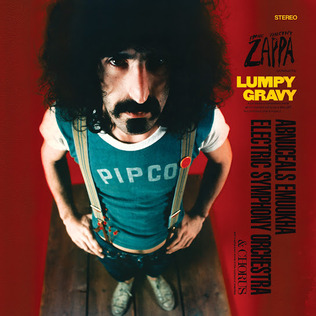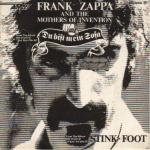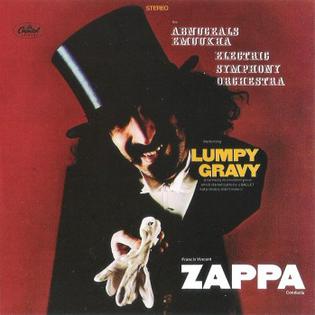
We're Only in It for the Money is the third album by American rock band the Mothers of Invention, released on March 4, 1968, by Verve Records. As with the band's first two efforts, it is a concept album, and satirizes left- and right-wing politics, particularly the hippie subculture, as well as the Beatles' album Sgt. Pepper's Lonely Hearts Club Band. It was conceived as part of a project called No Commercial Potential, which produced three other albums: Lumpy Gravy, Cruising with Ruben & the Jets, and Uncle Meat.

Freak Out! is the debut studio album by American rock band the Mothers of Invention, released on June 27, 1966, by Verve Records. Often cited as one of rock music's first concept albums, it is a satirical expression of frontman Frank Zappa's perception of American pop culture and the nascent freak scene of Los Angeles. It was also one of the earliest double albums in rock music, as well as the first two-record debut album. In the UK, the album was originally released as an edited single disc.

James Inkanish, Jr., known professionally as Jimmy Carl Black, was a drummer and vocalist for the Mothers of Invention.

Uncle Meat is the sixth album by the Mothers of Invention, and seventh overall by Frank Zappa, released as a double album in 1969. Uncle Meat was originally developed as a part of No Commercial Potential, a project which spawned three other albums sharing a conceptual connection: We're Only in It for the Money, Lumpy Gravy and Cruising with Ruben & the Jets.

Civilization Phaze III is the sixty-third album by Frank Zappa, released posthumously as a double album on October 31, 1994. It was the first studio album of new material from Zappa since 1986's Jazz from Hell. The album marks the third part of a conceptual continuity that started with We're Only in It for the Money (1968), with the second part being a re-edited version of Zappa's 1967 album Lumpy Gravy. Zappa described the album as a "two-act opera", but in lieu of traditional recitatives and arias, it alternates brief spoken word passages with musical numbers created on a Synclavier using a combination of sampled and synthesized sounds. Much of the sampled material in the second half of the album was originally recorded by Ensemble Modern and other musicians to Zappa's specifications.

Lumpy Gravy is a 1968 solo album by Frank Zappa, written by Zappa and performed by a group of session players he dubbed the Abnuceals Emuukha Electric Symphony Orchestra & Chorus. Zappa conducted the orchestra but did not perform on the album. It is his fourth album overall: his previous releases had been under the name of his group, the Mothers of Invention.

Cruising with Ruben & the Jets is the fourth album by the Mothers of Invention, and fifth overall by Frank Zappa, released under the alias Ruben and the Jets. Released on December 2, 1968 on Bizarre and Verve Records with distribution by MGM Records, it is a concept album, influenced by 1950s doo-wop and rock and roll. The album's concept deals with a fictitious Chicano doo-wop band called Ruben & the Jets, represented by the cover illustration by Cal Schenkel, which depicts the Mothers of Invention as anthropomorphic dogs. It was conceived as part of a project called No Commercial Potential, which produced three other albums: Lumpy Gravy, We're Only in It for the Money and Uncle Meat.

The Mothers of Invention was an American rock band from California. Formed in 1964, their work is marked by the use of sonic experimentation, innovative album art, and elaborate live shows.
Calvin "Cal" Schenkel is an American illustrator, graphic designer, animator and comics artist, specializing in album cover design.

Joe's Corsage is a compilation album featuring music recorded by Frank Zappa with The Mothers of Invention in the mid-1960s, before the recording of their debut album Freak Out! (1966). The album was compiled by archivist Joe Travers, and its title is a play on Zappa's 1979 work Joe's Garage.
Xenochrony is a studio-based musical technique developed at an unknown date, but possibly as early as the early 1960s, by Frank Zappa, who used it on several albums. Xenochrony is executed by extracting a guitar solo or other musical part from its original context and placing it into a completely different song, to create an unexpected but pleasing effect. He said that this was the only way to achieve some rhythms.
Pal Recording Studio (1957–1964) was an independent recording studio that operated in Cucamonga, California, an unincorporated community in San Bernardino County that later merged with the communities of Alta Loma, and Etiwanda to form Rancho Cucamonga. The studio was started by engineer/innovator Paul Buff. The studio is known for its instrumental Surf music recordings such as "Wipe Out" and the original demo recording of "Pipeline". The first location was at 8020 North Archibald Avenue. Later, the studio moved down the street to 8040.
"Absolutely Free" is a song written by Frank Zappa and released on the Mothers of Invention album We're Only in It for the Money in 1968. The song is not to be confused with the Mothers of Invention album of the same name.
"Duodenum" is a song by Frank Zappa that first appeared as part of "Lumpy Gravy Part One" on the Verve Records edition of Lumpy Gravy. A surf music instrumental, it runs for approximately 1:32 and is the second identifiable track on the album, preceded by "The Way I See It, Barry" and followed by "Oh No". Documentation purports that this piece was likely produced and recorded by Zappa sometime between 1963 and 1965.

The Lumpy Money Project/Object is a compilation album by Frank Zappa. Released posthumously on January 23, 2009 as Official Release #85, it compiles the releases Lumpy Gravy and We're Only in It for the Money with previously unreleased material, with the overall package serving as an audio documentary of the production of the two albums, which share conceptual continuity themes. It is project/object #2 in a series of 40th Anniversary FZ Audio Documentaries, following MOFO (2006).

The Old Masters is a box set series by Frank Zappa, released in three volumes on Barking Pumpkin Records from April 1985 to December 1987, consisting of studio and live albums by Zappa and The Mothers of Invention originally released from 1966 to 1976 on other labels, as well as "Mystery Discs" which contained previously unreleased material. The graphics on all three sets was airbrush illustrated by Larry Grossman. 200 Motels was not included in the series as it was the only Zappa/Mothers album for which Zappa was unable to secure the rights.
Euclid James "Motorhead" Sherwood was an American rock musician notable for playing soprano, tenor and baritone saxophone, tambourine, vocals and vocal sound effects in Frank Zappa's Mothers of Invention. He appeared on all the albums of the original Mothers line-up and the 'posthumous' releases Burnt Weeny Sandwich and Weasels Ripped My Flesh, as well as certain subsequent Zappa albums. He also appeared in the films 200 Motels, Video from Hell and Uncle Meat.

Bunk Gardner is an American musician who most notably played for the original version of Frank Zappa's Mothers of Invention until the group disbanded in 1969. He plays woodwinds and tenor sax.

"Sofa" is a composition by American musician Frank Zappa, released in 1975 on One Size Fits All. In 1993, the year of Zappa's death, Steve Vai covered "Sofa" for Zappa's tribute album Zappa's Universe. The cover won a Grammy Award for Best Rock Instrumental Performance in 1994. This was Vai's first of three Grammies.

Lumpy Gravy, also known as Lumpy Gravy (Primordial), is the recalled original debut solo album by Frank Zappa. It is an entirely orchestral recording written by Zappa and performed by a group of session players he dubbed the Abnuceals Emuukha Electric Symphony Orchestra. Zappa conducted the orchestra but did not perform on the album. It was commissioned and briefly released, on August 7, 1967, by Capitol Records in the 4-track Stereo-Pak format only and then withdrawn due to a lawsuit from MGM Records. MGM claimed that the album violated Zappa's contract with their subsidiary, Verve Records, and the album was recalled.














